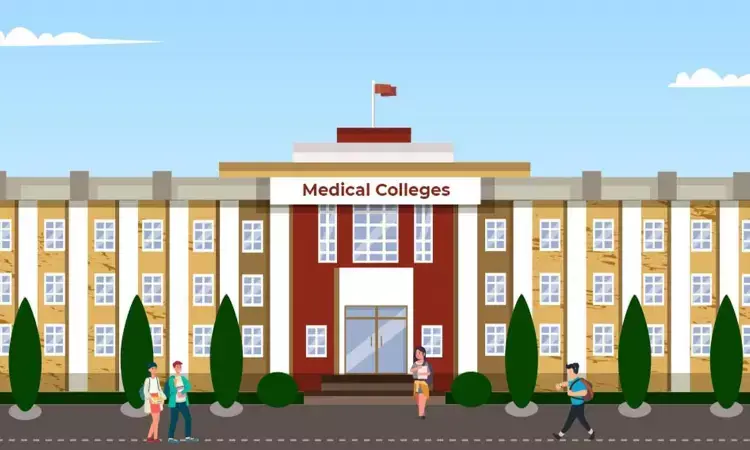- Home
- Medical news & Guidelines
- Anesthesiology
- Cardiology and CTVS
- Critical Care
- Dentistry
- Dermatology
- Diabetes and Endocrinology
- ENT
- Gastroenterology
- Medicine
- Nephrology
- Neurology
- Obstretics-Gynaecology
- Oncology
- Ophthalmology
- Orthopaedics
- Pediatrics-Neonatology
- Psychiatry
- Pulmonology
- Radiology
- Surgery
- Urology
- Laboratory Medicine
- Diet
- Nursing
- Paramedical
- Physiotherapy
- Health news
- Fact Check
- Bone Health Fact Check
- Brain Health Fact Check
- Cancer Related Fact Check
- Child Care Fact Check
- Dental and oral health fact check
- Diabetes and metabolic health fact check
- Diet and Nutrition Fact Check
- Eye and ENT Care Fact Check
- Fitness fact check
- Gut health fact check
- Heart health fact check
- Kidney health fact check
- Medical education fact check
- Men's health fact check
- Respiratory fact check
- Skin and hair care fact check
- Vaccine and Immunization fact check
- Women's health fact check
- AYUSH
- State News
- Andaman and Nicobar Islands
- Andhra Pradesh
- Arunachal Pradesh
- Assam
- Bihar
- Chandigarh
- Chattisgarh
- Dadra and Nagar Haveli
- Daman and Diu
- Delhi
- Goa
- Gujarat
- Haryana
- Himachal Pradesh
- Jammu & Kashmir
- Jharkhand
- Karnataka
- Kerala
- Ladakh
- Lakshadweep
- Madhya Pradesh
- Maharashtra
- Manipur
- Meghalaya
- Mizoram
- Nagaland
- Odisha
- Puducherry
- Punjab
- Rajasthan
- Sikkim
- Tamil Nadu
- Telangana
- Tripura
- Uttar Pradesh
- Uttrakhand
- West Bengal
- Medical Education
- Industry
Maharashtra plans to add 1,600 MBBS seats under PPP model

Mumbai: With an aim to improve the doctor-to-patient ratio in the State and in order to improve tertiary healthcare facilities, the Maharashtra Government is planning to add 1,600 MBBS seats in 16 districts of the State.
In order to ensure realization of the plan, the Government is planning to use the PPP model for establishing new medical colleges in 16 districts including Ahmednagar, Amravati, Buldhana, Hingoli, Jalna, Nashik, Palghar and Ratnagiri, suburban Mumbai and Thane, adds TOI. Apart from this, the State is also planning to add 50 MBBS sears in the existing Government medical colleges.
The daily adds that in order to reach out to maximum number of potential investors and partners for the materialization of the PPP model, Maharashtra arranged a day's investors' conference on Tuesday.
As per the data provided by the MoS Health Dr. Bharati Pravin Pawar, Maharashtra has a total number of 59 medical colleges with an intake capacity of 9450 MBBS seats. Among these, 28 medical colleges are run by the Government and there are 4630 MBBS seats in these institutes. Apart from this, there are 31 medical colleges with an intake capacity of 4820 MBBS seats are by private management.
Although the World Health Organization (WHO) recommends the availability of one doctor for every 1,000 people, the ratio in case of Maharashtra is 0.84 to 1,000. The statement released by the Medical Education Department clarifies that as per the current availability of new post-graduate doctors, it will take more than 20 years to reach the desired ratio.
Also Read: Total MBBS pool of seats up to 89,000
The recent media report by Times of India adds that in order to reach the desired goal regarding the doctor-to-patient ratio, the State Government is working on executing the massive expansion plan for medical education by adding 1,600 MBBS seats in 16 districts of Maharashtra by following a PPP model.
Apart from this, the State is also working for increasing the intake capacity for post-graduate and super-specialty courses. The plan is to increase the PG medical seats by 1,100 seats within the coming three years and plans are also underway for the upgradation of for existing super-specialty hospitals and creating 400 super-specialty seats from 2026 onwards.
This will ultimately lead to provide for around three lakh OPDs (out-patient departments) and 75,000 IPDs (in-patient departments) on an yearly basis. So, with all these plans under progress, Maharashtra's vision is to reach some of the targets in the coming decade.
Speaking about the same, Dr Avinash Supe, former director of BMC hospitals told TOI, "The plan is to enhance quality healthcare services in regions where it is not available or are inadequate, so that they do not rush to big cities for treatment."
Mentioning that NITI Aayog had advocated in favour of using PPP models for expansion in medical education sector, an official from the department told the daily that Maharashtra is trying to utilize this model for reaching its goal.
The Statement from the Department read, "Limited and staggered availability of finances and shortage of skilled professionals, including doctors and support staff, opens a window for public-private partnership for establishing new medical colleges and managing certain operations of the existing institutions."
"The need for better health-care facilities was felt during the pandemic," it added.
M.A in English Barsha completed her Master's in English from the University of Burdwan, West Bengal in 2018. Having a knack for Journalism she joined Medical Dialogues back in 2020. She mainly covers news about medico legal cases, NMC/DCI updates, medical education issues including the latest updates about medical and dental colleges in India. She can be contacted at editorial@medicaldialogues.in.


